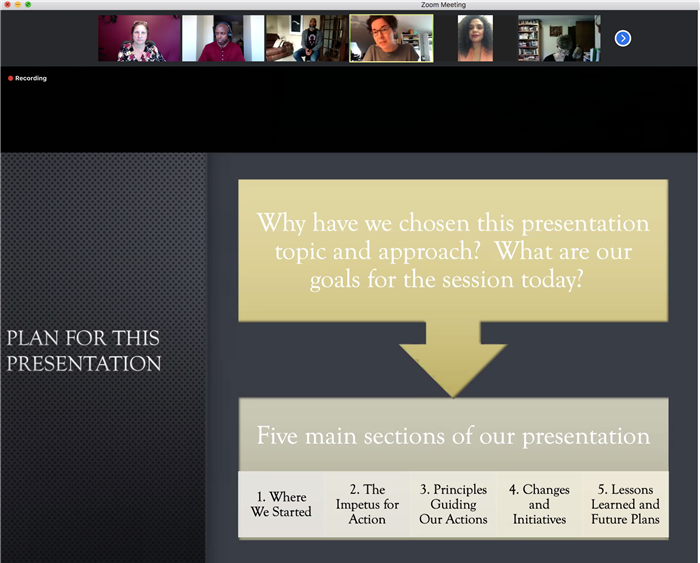Lake Forest staff, faculty lead ACM antiracism talk

Three Lake Forest College staff and faculty were the first presenters in a year-long collaborative antiracism initiative sponsored by the Associated Colleges of the Midwest (ACM) on September 24.
In a 90-minute Zoom session attended by nearly 400 faculty and staff from the 14 ACM schools, Office of Intercultural Relations Director Claudia Ramirez Islas, Assistant Director André Meeks, and Professor of History and Director of the Office of Faculty Development Anna Jones addressed “Charting the ‘How’: Coalition Building and Policy Change in the Age of Anti-Racism.”
"This has been a particularly trying, challenging and heartbreaking year," ACM President Sonya Malunda said at the outset of the meeting. She noted that the large number of colleagues who attended the first ACM talk “demonstrates the importance of and interest in how we build coalitions to address antiracism.”
During their presentation, the Lake Forest group shared what events occurred on campus over the past two years that prompted the College to create partnerships among faculty, staff, and students that have led to a multi-faceted set of initiatives and policy changes.
“We needed to provide spaces where we could all come together,” Ramirez Islas said. “Students were yearning for a level of stability and partnership with staff and faculty.”
To create that level of stability, a variety of initiatives and training for faculty, staff, and students were undertaken.
Some of the initiatives included the formation of groups on campus, including resurrecting the Intercultural Advisory Group with student, faculty, and staff representatives; forming a group for Black, Indigenous and People of Color (BIPOC) faculty and staff to network, connect, and support one another on a regular basis; and establishing opportunities for community dialogue on Diversity, Equity and inclusion issues through the monthly Brown Bag Lunch discussions as well as supporting student activism and expanding empowerment groups.
Other efforts include enriching the diversity of in-class curriculum across all disciplines; reading Ibram Kendi’s How to be an Antiracist campus-wide; and establishing a weekly support space for students of color led by a Black therapist and a series of workshops on tough topics, such as Self-Advocacy, Cultural Empathy, and Moving Past Diversity: Navigating Difficult Conversations Around Equity, Racialized Trauma/Racial Battle Fatigue.
Changes in departments, including the Health and Wellness Center, Public Safety, Library, Career Advancement Center, Athletics, and Admissions also were highlighted.
“Through a variety of recurring, ongoing events, we’ve made it much more difficult to ignore racial bias issues on campus,” Jones told the group. A complete list of initiatives can be found on the College’s Diversity, Equity and Inclusion Initiatives web page.
Looking ahead, the ACM will host a number of sessions through the 2020–21 academic year for faculty and staff, including "Inclusive Discourse—Bringing Everyone to the Table," "Free Speech and Disagreement," and "Culturally Responsive Student Mentorship."

